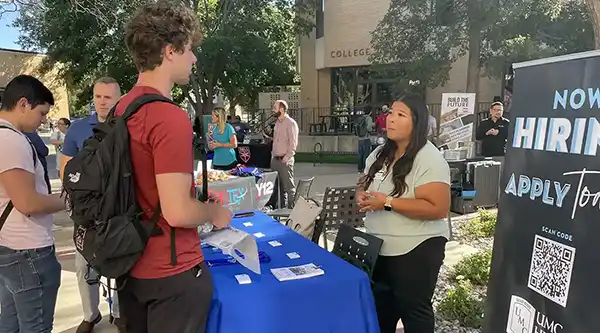Networking
Networking is about making connections and building rapport with people. It helps you get the information, advice, resources, referrals and job leads that you need to succeed in your career.
Where Should You Network?
You make connections with others everywhere, so always be on the lookout.
Below are a few common places to start.
- Amarillo College Job Fairs
- Student Organizations
- Internships
- Volunteer Activities
- Relatives/Acquaintances
- Coworkers
- Alumni
- Professional Associations
- Social Media: LinkedIn, Twitter, etc.

Amarillo College Job Fair
How Do You Network?
- Prepare an "elevator speech." When introducing yourself, be prepared to share your academic and professional achievements and intended goals within 30 – 60 seconds.
- Act with confidence even if you feel shy or intimidated, and always speak passionately about your interests and accomplishments.
- Communicate in a warm and sincere way. Learn people’s names, make eye contact, and listen intently.
- Follow through with referrals, and always thank your contacts in writing for their time and assistance.
- Look for ways that you and your contacts can help each other, and build a reputation of being a resource for others.
- Create a system for tracking contact information and notes.
- Manage your “online image” and be cautious about what employers might find.
Can I Network Virtually?
LinkedIn is the world’s largest online professional networking site with more than 175 million members in over 200 countries and territories. It is a critical brand-building tool that allows you to:
- Build and manage your professional presence.
- Connect professionally with classmates, faculty members, family, work or internship colleagues, and other key contacts.
- Find new career opportunities.
- Manage and maintain your list of professional contacts.
Most professionals use and take LinkedIn seriously. While an established presence on Facebook, Instagram, or Twitter is good, a strong, polished presence on LinkedIn can set you apart in the job market. Learn how to network and build your online brand with LinkedIn.